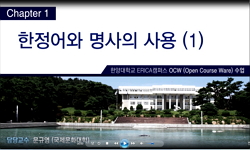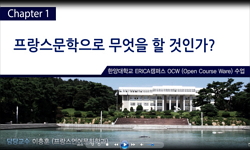France is the country of the implementing Parties which have Access and Benefit-Sharing (ABS) Regime, with the relatively appropriately right combination of users and providers. This paper observed carefully on the possible changes of legal status of ...
http://chineseinput.net/에서 pinyin(병음)방식으로 중국어를 변환할 수 있습니다.
변환된 중국어를 복사하여 사용하시면 됩니다.
- 中文 을 입력하시려면 zhongwen을 입력하시고 space를누르시면됩니다.
- 北京 을 입력하시려면 beijing을 입력하시고 space를 누르시면 됩니다.

프랑스의 나고야의정서상 접근 및 이익 공유(ABS)에 관한국내이행 법제 동향 = Implementing the Access and Benefit-Sharing under the Nagoya Protocol in France
한글로보기부가정보
다국어 초록 (Multilingual Abstract)
At the end of the day, the France ABS regime must maintain consistency not only with the Nagoya Protocol, but also with the international regime on ABS. As a result, the concern of the trading partners in the world will be able to be solved. Therefore, adopting the Biodiversity law is important, but showing a constructive commitment to international equity, transparency in the use of genetic resources and associated traditional knowledge, and towards promoting full respect for human rights both domestically and abroad is also important. In this respect, the french DBL shows the endeavors for harmonization between users and providers of genetic resources and associated traditional knowledge.
In this regard, Korea need to be careful for the countermeasures as a user country as well as a provider country involved in domestic ABS regulatory approaches for the compliance of the Nagoya Protocol. By taking into consideration of the Nagoya Protocol and ABS regimes of other countries could prevent conditions which breed conflicts in advance. This will undoubtedly be a something worth reviewing at the same time taking the follow-up measures on the Access to Genetic Resources and Benefit Sharing Act.
France is the country of the implementing Parties which have Access and Benefit-Sharing (ABS) Regime, with the relatively appropriately right combination of users and providers. This paper observed carefully on the possible changes of legal status of genetic resources and associated traditional knowledge, application scope of ABS provisions of the draft Biodiversity Law (DBL), three measures for access such as declarative procedures, authorization procedures concerning access to genetic resources and authorization procedures concerning access to traditional knowledge associated with genetic resources, benefit-sharing obligations, promotion of compliance with domestic legislation and regulatory requirements on ABS, and characteristics and implications in the implementation of the Nagoya Protocol in France.
At the end of the day, the France ABS regime must maintain consistency not only with the Nagoya Protocol, but also with the international regime on ABS. As a result, the concern of the trading partners in the world will be able to be solved. Therefore, adopting the Biodiversity law is important, but showing a constructive commitment to international equity, transparency in the use of genetic resources and associated traditional knowledge, and towards promoting full respect for human rights both domestically and abroad is also important. In this respect, the french DBL shows the endeavors for harmonization between users and providers of genetic resources and associated traditional knowledge.
In this regard, Korea need to be careful for the countermeasures as a user country as well as a provider country involved in domestic ABS regulatory approaches for the compliance of the Nagoya Protocol. By taking into consideration of the Nagoya Protocol and ABS regimes of other countries could prevent conditions which breed conflicts in advance. This will undoubtedly be a something worth reviewing at the same time taking the follow-up measures on the Access to Genetic Resources and Benefit Sharing Act.
국문 초록 (Abstract)
결국 중요한 점은 프랑스 국내법인 DBL은 ‘나고야의정서’뿐만 아니라, ‘ABS에 관한 국제적 레짐’(international regime)에 대하여도 전체적인 ‘일관성’을 유지해야 한다는 것이다. 이로서 대외 무역파트너들의 우려를 제거하게 될 것이다. 이는 생물다양성법의 채택이라는 결과 자체에만 의미가 있는 것이 아니라, 대외적으로 유전자원 및 관련 TK의 이용에 관한 투명성, 국제적 형평, 그리고 온전한 인권존중의 증진을 향한 ‘건설적 약속’을 보여주는 것이기도 하다. 이러한 측면에서 프랑스의 생물다양성법은 이용자와 제공자의 입장을 비교적 적절히 조화시키고자 노력을 기울였음을 알 수 있다.
우리나라도 나고야의정서에서 명확하게 규정하지 않은 부분을 포함하여 나고야의정서에 대한 국내 ABS 법률을 이행함에 있어서, ‘나고야의정서’ 뿐만 아니라 ‘국제사회의 여러 다른 당사국들의 ABS 이행 동향’을 참고하여 이행해야 향후 발생할 수 있는 각종 분쟁의 소지를 사전에 방지할 수 있을 것이다. 나고야의정서 비준후 ABS 법제 마련을 미루고 있는 당사국들도 많은 만큼, 나고야의정서 대응과 관련하여 타국 ABS 동향을 지켜보면서 ‘국익’을 위해 속도를 조절할 필요도 있어 보인다. 이는 유전자원법 제정 이후의 후속조치 마련과 함께 되짚어볼 가치가 있는 일이다. 비록 현재로서의 국익을 고려하면 이용국의 입장일수는 있으나 국제사회에서 나고야의정서에 대한 이행체계가 정착되어 갈수록 이용자와 제공자 간의 균형이나 조화를 추구하게 될 것이다.
프랑스는 나고야의정서 당사국들 중에 이용국과 제공국의 입장을 비교적 적절히 조화시켜 ABS체계를 마련하고 있는 국가에 해당된다. 이 글에서는 프랑스에서의 유전자원 및 관련 TK의 ‘법...
프랑스는 나고야의정서 당사국들 중에 이용국과 제공국의 입장을 비교적 적절히 조화시켜 ABS체계를 마련하고 있는 국가에 해당된다. 이 글에서는 프랑스에서의 유전자원 및 관련 TK의 ‘법적 지위’의 변화 가능성, DBL의 ABS 규정의 적용 범위, 유전자원 및 관련 TK로의 접근을 위한 3 가지 접근 절차(신고 절차, 유전자원에 대한 접근 허가 절차, 유전자원 관련 TK에 대한 접근 허가 절차) 및 이익 공유 의무, 나고야의정서 이행에 대한 국제적 이행의무준수의 증진, 그리고 나고야의정서 이행상의 특징과 시사점에 관하여 살펴보았다.
결국 중요한 점은 프랑스 국내법인 DBL은 ‘나고야의정서’뿐만 아니라, ‘ABS에 관한 국제적 레짐’(international regime)에 대하여도 전체적인 ‘일관성’을 유지해야 한다는 것이다. 이로서 대외 무역파트너들의 우려를 제거하게 될 것이다. 이는 생물다양성법의 채택이라는 결과 자체에만 의미가 있는 것이 아니라, 대외적으로 유전자원 및 관련 TK의 이용에 관한 투명성, 국제적 형평, 그리고 온전한 인권존중의 증진을 향한 ‘건설적 약속’을 보여주는 것이기도 하다. 이러한 측면에서 프랑스의 생물다양성법은 이용자와 제공자의 입장을 비교적 적절히 조화시키고자 노력을 기울였음을 알 수 있다.
우리나라도 나고야의정서에서 명확하게 규정하지 않은 부분을 포함하여 나고야의정서에 대한 국내 ABS 법률을 이행함에 있어서, ‘나고야의정서’ 뿐만 아니라 ‘국제사회의 여러 다른 당사국들의 ABS 이행 동향’을 참고하여 이행해야 향후 발생할 수 있는 각종 분쟁의 소지를 사전에 방지할 수 있을 것이다. 나고야의정서 비준후 ABS 법제 마련을 미루고 있는 당사국들도 많은 만큼, 나고야의정서 대응과 관련하여 타국 ABS 동향을 지켜보면서 ‘국익’을 위해 속도를 조절할 필요도 있어 보인다. 이는 유전자원법 제정 이후의 후속조치 마련과 함께 되짚어볼 가치가 있는 일이다. 비록 현재로서의 국익을 고려하면 이용국의 입장일수는 있으나 국제사회에서 나고야의정서에 대한 이행체계가 정착되어 갈수록 이용자와 제공자 간의 균형이나 조화를 추구하게 될 것이다.
참고문헌 (Reference)
1 국립생물자원관, "유전자원 접근과 이익공유 사례 연구" 국립생물자원관 2012
2 홍형득, "우리나라 ABS(나고야의정서) 대응정책의 평가와 과제" 한국기술혁신학회 16 (16): 506-529, 2013
3 박균성, "수리를 요하는 신고의 구별기준에 관한 연구" 법학연구소 48 (48): 495-524, 2013
4 강명수, "나고야의정서와 유전자원 관련 특허: 한국 교역에 미치는 영향" 한국무역보험학회 18 (18): 163-195, 2017
5 김수석, "나고야의정서에 대응한 농림업 유전자원의 보존 및 이용 방안" 한국농촌경제연구원 2016
6 김두수, "나고야의정서상의 상호합의조건(MAT)과 해양미생물의 접근 및 이익 공유(ABS)에 관한 EU Micro B3 모델협정" 대한국제법학회 61 (61): 41-70, 2016
7 국립생물자원관, "나고야의정서 해설서" 국립생물자원관 2014
8 이상준, "나고야의정서 국내이행을 위한 국내 유전자원 접근 신고에 대한 소고" 한국환경법학회 38 (38): 295-324, 2016
9 "http://www.parc-amazonien-guyane.fr/tresors-de-nature/biodiversite/"
10 "http://www.microb3.eu/"
1 국립생물자원관, "유전자원 접근과 이익공유 사례 연구" 국립생물자원관 2012
2 홍형득, "우리나라 ABS(나고야의정서) 대응정책의 평가와 과제" 한국기술혁신학회 16 (16): 506-529, 2013
3 박균성, "수리를 요하는 신고의 구별기준에 관한 연구" 법학연구소 48 (48): 495-524, 2013
4 강명수, "나고야의정서와 유전자원 관련 특허: 한국 교역에 미치는 영향" 한국무역보험학회 18 (18): 163-195, 2017
5 김수석, "나고야의정서에 대응한 농림업 유전자원의 보존 및 이용 방안" 한국농촌경제연구원 2016
6 김두수, "나고야의정서상의 상호합의조건(MAT)과 해양미생물의 접근 및 이익 공유(ABS)에 관한 EU Micro B3 모델협정" 대한국제법학회 61 (61): 41-70, 2016
7 국립생물자원관, "나고야의정서 해설서" 국립생물자원관 2014
8 이상준, "나고야의정서 국내이행을 위한 국내 유전자원 접근 신고에 대한 소고" 한국환경법학회 38 (38): 295-324, 2016
9 "http://www.parc-amazonien-guyane.fr/tresors-de-nature/biodiversite/"
10 "http://www.microb3.eu/"
11 "http://www.iisd.ca/biodiv/cop10/"
12 "http://www.fondationbiodiversite.fr/images/stories/telechargement/ed_48_apa_outre_mer.pdf"
13 "http://www.developpement-durable.gouv.fr/spip.php?page=article&id_article=36324"
14 "http://www.developpement-durable.gouv.fr/IMG/pdf/1-MEDDTL-Synthese-Protocole-Nagoya.pdf"
15 "http://www.cbd.int/convention/parties/list/"
16 "http://www.cbd.int/abs/measures/default.shtml"
17 "http://www.arnaudgossement.com/media/01/00/1984099581.doc"
18 "http://www.agri85.fr/V4/le-projet-de-loi-biodiversite-sera-transmis-au-conseil-dtat-debut-janvier-actualite-numero-5295.php"
19 "http://inpn.mnhn.fr//synthese/sommaire-syntheses-indicateurs"
20 "http://biodiv.mnhn.fr/convention/le-protocole-de-nagoya-sur-l-acces-et-le-partage-des-avantages"
21 "Regulation 511/2014/EU of the European Parliament and of the Council of 16 April 2014 on compliance measures for users from the Nagoya Protocol on Access to Genetic Resources and the Fair and Equitable Sharing of Benefits Arising from Utilization in the Union"
22 "Regulation 338/97/EC of the Council of 9 December 1996 on the protection of species of wild fauna and flora by regulating trade therein"
23 Sands, Philippe, "Principles of International Environmental Law" Cambridge Univ. Press 2012
24 "Nagoya Protocol on Access to Genetic Resources and the Fair and Equitable Sharing of Benefits arising from their Utilization to the Convention on Biological Diversity"
25 ENB, "Monday" 9 (9): 2010
26 Chiarolla, Claudio, "John Pitseys and Tom Dedeurwaerdere, Implementing the Nagoya Protocol: Comparing Access and Benefit-Sharing Regimes in Europe" Brill Nijhoff 2015
27 Rodríguez, Lily O., "Implementing the Nagoya Protocol: Comparing Access and Benefit-Sharing Regimes in Europe" Brill Nijhoff 2015
28 "Implementing Regulation 2015/1866/EU of 13 October 2015 laying down detailed rules for the implementation of Regulation 511/2014/EU of the European Parliament and of the Council as regards the register of collections, monitoring user compliance and best practices"
29 Wallbott, Linda, "Global Governance of Genetic Resources: Access and benefit sharing after the Nagoya Protocol" Routledge 2014
30 Tvedt, Morten Walløe, "Global Governance of Genetic Resources: Access and benefit sharing after the Nagoya Protocol" Routledge 2014
31 "Forskrift om beskyttelse av tradisjonell kunnskap knyttet til genetisk materiale"
32 김두수, "EU환경법" 한국학술정보 2012
33 김두수, "EU법" 한국학술정보 2014
34 "Code de l’environnement de la province sud de Nouvelle Caledonie, France"
35 Vogel, Joseph Henry, "Biodiversity and the Law: Intellectual Property, Biotechnology and Traditional Knowledge" Earthscan 2007
36 République Française, "Accès aux ressources génétiques et partage des avantages issus de leur utilisation(APA). Comprendre le fonctionnement du mécanisme d’APA et les dispositions clés du Protocole de Nagoya" 2011
동일학술지(권/호) 다른 논문
-
OECD NCP 동료심사(Peer Review)에 관한 법적 고찰:한계와 개선방안
- (사)한국국제경제법학회
- 강준하
- 2018
- KCI등재
-
EU의 국가 안보 근거 외국인 직접 투자 규제 규칙도입 논의 및 한국에 대한 함의
- (사)한국국제경제법학회
- 강성진
- 2018
- KCI등재
-
친환경 에너지 발전(發電)의 국내물품사용요건(DCR)에 관한 India - Solar Cells 사건 고찰
- (사)한국국제경제법학회
- 김승민
- 2018
- KCI등재
-
- (사)한국국제경제법학회
- 공수진
- 2018
- KCI등재
분석정보
인용정보 인용지수 설명보기
학술지 이력
| 연월일 | 이력구분 | 이력상세 | 등재구분 |
|---|---|---|---|
| 2026 | 평가예정 | 재인증평가 신청대상 (재인증) | |
| 2020-04-06 | 학회명변경 | 한글명 : 한국국제경제법학회 -> (사)한국국제경제법학회영문명 : International Economic Law Association of Korea -> Korean Society of International Economic Law |  |
| 2020-01-01 | 평가 | 등재학술지 유지 (재인증) |  |
| 2017-01-01 | 평가 | 등재학술지 유지 (계속평가) |  |
| 2013-01-01 | 평가 | 등재학술지 선정 (등재후보2차) |  |
| 2012-01-01 | 평가 | 등재후보 1차 PASS (등재후보1차) |  |
| 2010-01-01 | 평가 | 등재후보학술지 선정 (신규평가) |  |
학술지 인용정보
| 기준연도 | WOS-KCI 통합IF(2년) | KCIF(2년) | KCIF(3년) |
|---|---|---|---|
| 2016 | 1.18 | 1.18 | 0.96 |
| KCIF(4년) | KCIF(5년) | 중심성지수(3년) | 즉시성지수 |
| 1.1 | 0.91 | 1.373 | 0.13 |




 DBpia
DBpia







